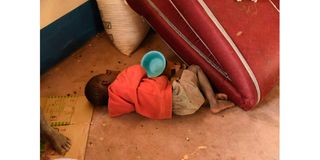5,000 learners missing in bandit-hit Baringo as schools reopen

A child whose family was displaced due to the insecurity in Baringo South sleeping on a classroom floor at Sinoni primary school where they had sought refuge on February 9, 2022.
What you need to know:
- Locals who fled villages with their children two months ago are yet to return to their homes due to the security uncertainty.
- Some schools in the border areas have reopened, but recorded low enrolment.
- Parents say perennial insecurity has derailed education in the region, with candidates performing dismally in national exams.
The fate of more than 5,000 learners in more than 20 primary and secondary schools in Baringo North and Baringo South sub-counties is unknown following bandit attacks.
The attacks and livestock theft had led to the closure of dozens of schools and other social amenities after thousands of locals fled to safer areas.
Some of the affected schools are Karne, Koitilil, Kapkechir, Tuiyotich, Arabal, Kapindasum, Kasiela, Sinoni, Chebinyiny primary schools, and Tuiyotich and Embosos secondary schools in Baringo South.
The affected schools in Baringo North that are yet to reopen after being closed indefinitely in March include Chepkesin and Kapturo primary schools.
Some schools in the border areas that have reopened, but recorded low enrolment, are Kagir, Chemoe, Kamwetio, Yatya, Kosile, and Ng’aratuko primary schools, and Yatya Secondary School.

A deserted Sinoni trading centre in Baringo South, Baringo County on March 08, 2022 following persistent bandit attacks.
Locals who fled the border villages two months ago are yet to return to their homes, with their school-going children fearing more attacks from gun-toting criminals who are reportedly still roaming the deserted villages.
Some of the villages deserted since the beginning of the year after bandits struck are Kitorongon, Menmeno, Seretion, Chepng'anian, Kapsikwon, Lomulel and Korkoron, Kapkechir, Tuiyotich, Ramacha, Katilomwo and Tandar. Kapindasum, and Soke, and Korkoron in Baringo South.
The latest exodus happened in March, after the killing of eight people in Kasiela and Sinoni villages. It saw a mass exodus from the adjacent villages of Arabal, Lamaiywe, Korkoron, Karne and Kapkechir.
Other deserted villages in Baringo North include Chepkesin, Ng’aratuko, Kapturo, Katulia, Sitek, Kamukule, Kapkormate, Kamwetio and Chepkewel.
In Baringo County alone, more than 25 people had been gunned down by bandits, with scores of others nursing gunshot wounds since the beginning of the year.
Parents say perennial insecurity has derailed education in the region, with candidates performing dismally in national exams.

Magdalene Chesoiyo prepares dinner for her children at Chepkewel on March 15, 2022, where they had moved after fleeing banditry attacks in their home in Kosile.
Richard Chepchomei, a parent from the restive Chemoe village in Baringo North, said many learners may drop out of school after relocating to other villages since March.
“Most schools in the border areas have been closed since March due to the flare-ups [of violence] and locals moved to safer villages, tens of kilometres away. The government should track down the learners to ensure that all of them report to their respective schools to forestall dropouts,” Mr Chepchomei said.
To retain learners in school, he said, the government must beef up security.
Paul Kipyemat, from the banditry-prone Arabal in Baringo South, said he was disappointed that despite the presence of security officers in the areas, killings and livestock theft continue to be reported.
“We have lost more than eight people in Kasiela village alone in a span of one month, yet the government keeps saying there is security. How are we safe when killings are recorded every day?” wondered Mr Kipyemat.

Police officers patrol around Yatia centre on March 15, 2022. Locals moved out of their homes to safer places due to incessant bandit attacks.
But Baringo County Police Commander Adamson Bungei has said officials were working to help displaced people return to their homes and reopen all schools that were closed due to insecurity. He said this will be done in three weeks.
He said more officers will be deployed at every shopping center and school in the affected areas.
“We have involved the local administrators, clergy, political leaders and professionals to look at how best we can assist the displaced locals and ensure that their security is guaranteed. We want them to also tell us how best we can do things to bring sanity once and for all,” Mr Bungei said.
He raised concerns that many villages remained deserted despite the deployment of more security officers.
County Commissioner Abdirisack Jaldesa said displaced locals will be helped to return home once bandits have been flushed out.
“We want to confirm the safety of those affected areas before relocating the displaced people and we will make sure that they are back in their homes to pave the way for reopening of schools,” he said.
“The government will liaise with humanitarian agencies like the Kenya Red Cross to ensure that they rebuild their lives.”
Mr Jaldesa also said the months-long peace forums in the troubled Kerio Valley had helped bring calm in the Pokot and Marakwet communities.

Locals who fled Kapturo village in Baringo North Sub-County due to frequent attacks take refuge at Kapkomole village in the county on March 15, 2022.
Perennial insecurity has dealt a big blow to learning in the banditry-prone areas in Baringo County, with several schools yet to reopen after they were closed in 2005.
Three weeks ago, bandits struck Arabal Primary School in Baringo South and vandalised structures and destroyed learning materials worth millions of shillings.
Armed criminals suspected to be from neighbouring Tiaty sub-county struck the deserted school last week, vandalised doors and windows, destroyed learning materials and made away with some of the property.
Reports indicate that police reservists on patrol in the deserted Arabal village last week noticed the vandalism.
On taking a closer look, they noticed that criminals had broken all the windows and doors of all the eight classes, teachers’ quarters, headteacher’s office, staff room and library.
More than 32 laptops were destroyed and textbooks worth more than Sh1 million, files and instruction materials were damaged and strewn in the school compound. The vandals also made away with 36 iron sheets that were meant for school projects.
Police reports also indicate that the bandits broke a store in the school and stole food items, including 13 bags of rice of 50kg each meant for the school feeding programme.
Locals said the school's perimeter fence was dismantled, gate padlocks broken and generators and water pipes in the store stolen.
“The bandits also took 10 mattresses, clothing and cooking materials at the staff quarters, destroyed furniture, two water tanks and a lighting system was tampered with,” said Mr Kipyemat, a resident.
“After the massive destruction, the bandits inscribed some writings on the school gate and staffroom, including ‘usijaribu kurudi hapa utakufa’ (don’t come back here, you will die), warning locals of dire consequences if they dare go back to the deserted area.”
Concerned headteachers
Headteachers and locals have raised concerns that neighbouring schools risk being broken into by the bandits, who have occupied all the areas, including deserted homes.
Some schools will need to be rebuilt after they were vandalised by the armed bandits, who also killed dozens of people, including schoolchildren and teachers.
Some of the primary schools that have been shut for years in Baringo North, Baringo South and Tiaty sub-counties because of violence are Ramacha, Ruggus, Kamwetio, Chepkew, Loromoru, Barsuswo, Tandar, Katilomwo, Karkaron, Ng’elecha, Chepkesin and Chesitet.
Other schools often close when inter-community fighting erupts and reopen when normality returns.
They include Kapindasum Primary, Kasiela, Sinoni, Arabal, Chemorong’ion, Mukutani, Noosukro, Yatya, Chemoe, Kesumet, Kagir, Loruk, Kosile, Barketiew, Kapturo
Locals say insecurity has reduced school enrolment, with several learners dropping out of school after parents fled with them to safer areas.





